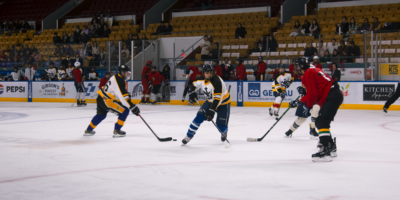Hi everyone, and welcome back to Waterloo for another term of great times with friends and wonderful summer weather! (Which also means sleeping in class, JobMine stress, and ubiquitous goose excrement, but that’s not important.)
I’m really excited to be the Iron Warrior Editor-in-Chief this term, and so far it’s been a blast! And I’m really glad it’s been going smoothly, since 2B mechatronics, as upper-year Trons will attest to, is not 2B taken lightly. (Yes, I will include the occasional cringe-worthy pun.) I was a little apprehensive of taking on the responsibility of being EIC during my 2B term, but it’s definitely proved to be much more fun than I thought it would be. All of the EICs in the past couple of terms have graduated or are on co-op (though being on co-op doesn’t stop Cameron from coming in and helping with layout), but the writers and editors contributing this term are all fantastic and helpful people. Maybe I won’t fail 2B after all…
Probably the biggest change to the Iron Warrior this term is that two of our familiar faces aren’t coming out to meetings anymore: we’re missing Leah and Nina, who both graduated last April. To both of you guys: all the best for the future! Otherwise, many of you readers will recognize our regular writers in this issue. We also want to welcome Tom, who is our new Photo Editor!
Our feature for this issue is Engineering Society Executive elections! Campaigning starts today, and elections are starting on June 3. Check out the centre spread for more info on each candidate’s platforms and how to vote for them!
Many of the columns you know and love are back as well. Prof Personalities returns as Ashlyn interviews Professor Irene Goldthorpe. Elizabeth covers an exhilarating season for the Raptors in The Benchwarmer Report. Sarah highlights movies you should go see this summer in Pop 101. Finally, Leafy Thoughts is being taken over by Brigita, who is appropriately starting the column off this term with a step-by-step walkthrough of how to compost with worms. (Eww.)
Last but definitely not least, distractions haven’t gone anywhere either: Kyle’s Dwarven Science and Cameron’s crossword and sudokus are still where you’d expect them to be!
Well, that’s all the introductory stuff out of the way. Now on to the meat and potatoes of this editorial. Or, as my illustrious ancestor, Alex McGowan (IW EIC, Spring ’86) put it, “Wow, my very own editorial!” So I want to take a second and talk about YouTube. I use YouTube for pretty much everything important—from listening to music (ok, you can’t find all the music, but the composers to my music have died a long, long time ago), to entertainment (Computerphile and Numberphile!), to studying for class sometimes (there’s a lot more than just Khan Academy). It’s a fantastic service that lets me watch whatever I want, whenever I want. The problem, as many of you will know, is that it becomes way too easy to just sit there and keep watching videos.
Now here’s another thing fellow co-op students might also be able to relate to. Know how you tell yourself that you’re going to do side projects while on co-op? Perhaps build a cool robot, take an online course, make a website, or start a band with your friends? And then it goes well for about two weeks, but then work and your PD course catch up to you, and you’re too exhausted to do anything after work so you end up wasting time on the Internet? Yeah, that was YouTube for me, and probably Netflix / Reddit / Facebook for some of the rest of you. Your nascent side project doesn’t survive all that long after that.
I like to call those kinds of distractions “passive hobbies”—the ones where you sit there watching YouTube or Netflix, or mindlessly scrolling through Facebook, where stories don’t have any intellectually stimulating content at all. (More often they have cats or something in them.) Contrast these with “active hobbies” like side projects, playing a musical instrument, or reading about what’s going on in the world: You actively invest a part of your mental energy into doing them, but the returns on that investment help you build your skills and knowledge.
YouTube doesn’t always have to be a source for passive hobbies, though. It can also be incredibly helpful for active hobbies, like side projects. Say you want to learn about basic electronic components and how to use them. YouTube videos are specially designed to present all the information you need to start building, within 15 short minutes of content. They gloss over why each of the components work (most videos come with a disclaimer like “This video will not make you an electrical engineer”), but they’re fantastic at helping you get started.
So how do we capture the benefits of YouTube without getting distracted? Well, this term I decided to try something new. I made the conscious choice of not getting Internet in my apartment. (I can hear the collective *gasp* many of you just made.) Yup, I live without an Internet connection. I always have my phone around, which allows me to keep connected to my friends through my data plan, but otherwise I have very limited access to web pages through my laptop. This means that most of the passive hobbies I had around during co-op are now gone. Now I have plenty of time to spend doing more meaningful things.
But what happened to capturing the benefits of the Internet? These days, it’s essential if you want to get started on something new. How would I connect to the web? For me, the answer is simple: I do my side projects (and most other work) on campus. I’ve always felt that the University campus is an environment where I can stay focused on active hobbies without trying too hard. I think it mostly comes down to the act of getting up off that couch you watch Netflix on and walking out the door to the outside world. At that point, you assume a different, “public” persona, which is motivated to be at its best, as opposed to your “private” persona, because your public persona is what you show off to the world. That simple act of walking out the door can inspire you to do things you would never have the motivation to do at home.
So what is the role of technology in this whole double-persona mess? I’ve hinted at what happens to YouTube in the two different situations: Either it becomes useful for active hobbies, when you’re acting as your public persona, or it becomes a real time-waster when you’re in private. Netflix isn’t as applicable, as it is specifically geared towards being used in people’s private lives, but content shown on Netflix does very often become a public forum for discussion and debate, and it becomes a part of people’s public persona that they are proud to show off.
The technology whose role I’m most intrigued about, with respect to public and private personas, is social media. Social media allows netizens to connect with others who live similar private lives. This goes both ways; on the one hand, social media helps those with, say, mental health problems, get in touch with others who have similar problems. Having a support community who understands your troubles is a huge help, and social media has made them far easier to reach out to. On the other hand, when people subscribe to social media they are exposed to so much information that there’s no way to critically analyze all of it. And when that happens, certain radical ideas that should have stayed private begin to go publicly unquestioned (*cough* Donald Trump *cough*). People begin to listen to only what they want to hear, and when they act, they don’t see that their actions have serious consequences for others.
Well, this is really starting to sound like a rant, so I’ll leave it there. As engineers, it’s incredibly important to make sure we understand what the societal implications of our technology might be. I hope you’ve gained some insight into why we should think critically about the information we are exposed to; you’re welcome to start right here, with this newspaper! If you disagree with anything we publish, you’re always welcome to send a letter to the editor at iwarrior@uwaterloo.ca. And with that, we invite you to sit back, relax, and enjoy!




Leave a Reply